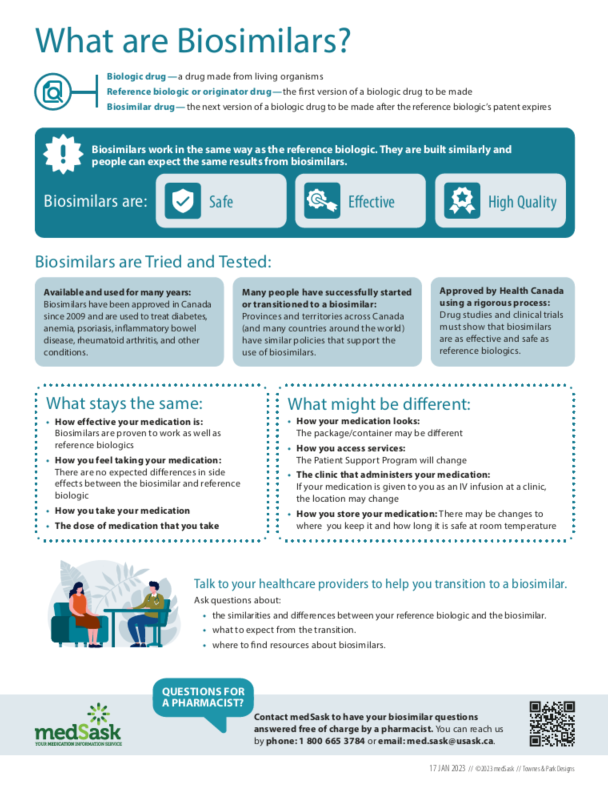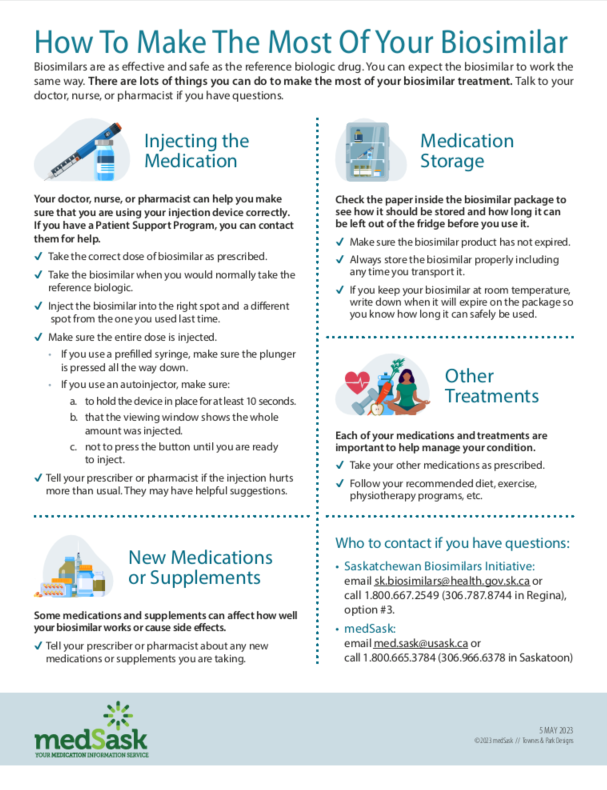Under the Saskatchewan Biosimilars Initiative, people who use a reference biologic drug that has an available biosimilar version will need to start using a biosimilar version by the end of the announced transition period to keep their coverage under the Saskatchewan Drug Plan.
People affected by the Biosimilars Initiative will receive a letter from the Saskatchewan Drug Plan. It will explain why the Saskatchewan Biosimilars Initiative is important and the next steps for people who will need to transition.
Background Information
Helpful Definitions
- Biologic drug: a drug made from living organisms
- Reference biologic or originator drug: the first version of a biologic drug to be made
- Biosimilar drug: the next version of a biologic drug to be made after the reference biologic’s patent expires
Saskatchewan Biosimilars Initiative.
Questions about biologic drugs and biosimilars? Want to talk to a pharmacist about transitioning to a biosimilar? You can contact us at medSask to have your questions answered. We can be reached by phone: 306-966-6378 (Saskatoon) or 1-800-665-3784 (Saskatchewan) or email: med.sask@usask.ca
Key Points
- Biosimilars are high quality, safe, and effective.
- Biosimilars work the same way as the reference biologic drug. They are built in a similar way. Many manufacturers of biologic drugs also make biosimilars.
- Health Canada will only approve a biosimilar if the manufacturer can prove it is as safe and as effective as the reference biologic. Once approved, the manufacturer must make sure the biosimilar continues to be safe.
- Biologic drugs have been used since the 1980’s and biosimilar versions of these drugs have been used in Canada since 2009.
- There is real world experience with transitioning to a biosimilar. Similar policies exist in other provinces and territories in Canada and many countries around the world.
More Information About Biosimilars
The Saskatchewan Biosimilars Initiative website provides important information about biosimilars as well as answers to questions that people impacted by the policy may be asking.
The Saskatchewan Biosimilars Initiative webpage has information for people who are transitioning to a biosimilar insulin.
The Health Canada Biosimilar biologic drugs in Canada: Fact Sheet explains key points about what biosimilar drugs are and how they are regulated in Canada.
CADTH has a list of common questions people ask about biosimilars.
Making the Most of Your Biosimilar
This resource can help you use your biosimilar in the most effective way. It includes tips on injecting your medication, storing your medication, and more.

Checklist
- Make an appointment with the health care provider who prescribes your reference biologic or ask your pharmacist for help.
- You will need a new prescription to start using a biosimilar version of your medication.
- If you use an insulin affected by the policy, your pharmacist can prescribe the biosimilar version.
- Review the available biosimilar options with your doctor, nurse, or pharmacist.
- You may have the option to enroll in a biosimilar patient support program. Your health care provider can help you with this.
Where applicable, Exception Drug Status (EDS) will already be in place for the biosimilar when you transition. EDS for the reference biologic will expire at the end of the announced transition period.
Private Insurance Coverage: Each plan is different, so you will need to ask your private insurance provider about how your drug coverage benefits are affected by the Saskatchewan Biosimilars Initiative.
Biosimilar Resources for Specific Conditions
- Arthritis Society: Concerned about switching to a biosimilar medication?
- Canadian Digestive Health Foundation Biosimilar Library: resources for people with Inflammatory Bowel Disease (IBD) to understand the process of switching to a biosimilar
- Arthritis Society Canada Biologics and Biosimilars for the Treatment of Inflammatory Arthritis: answers to general questions about biosimilars and specific information about biosimilars for Inflammatory Arthritis
- Joint Health Biosimilars Exchange: general information about biosimilars from a patient-led organization
- Diabetes: medSask Infographics, Humalog, Lantus and NovoRapid
- Multiple Sclerosis: MS Canada, Generic, biosimilar and subsequent entry non-biologic complex drugs